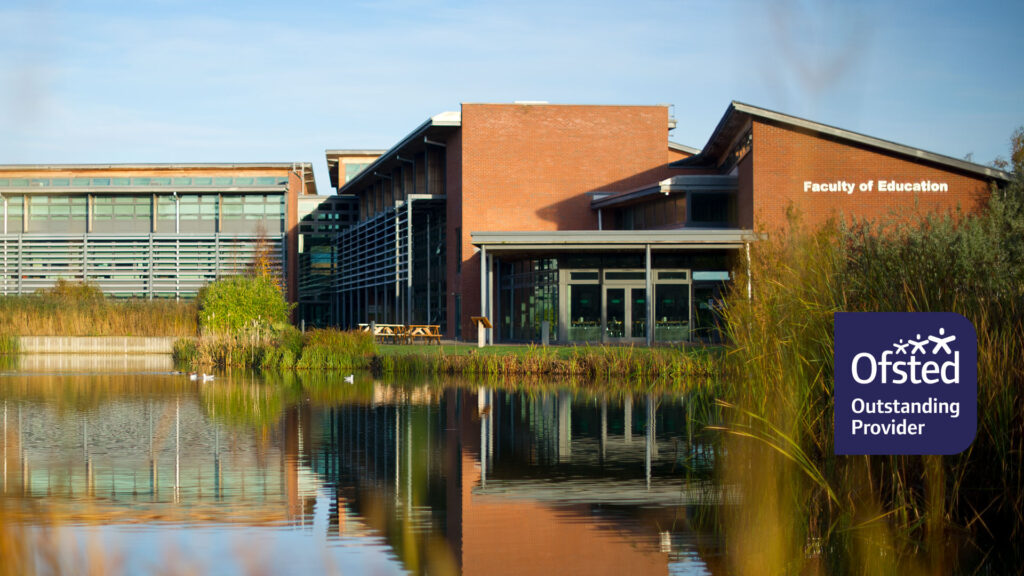Education MA
Place yourself at the cutting edge of education theory and practice, while developing as a forward-thinking education professional on a programme delivered full-time, part-time and online.
Overview
| Course length: | 1 year full-time 2 years part-time 2 years (Burnley College) part-time |
|---|---|
| Start dates: | September 2024 September 2025 |
| Location: | Edge Hill University |
| Subject(s): | Education and Teaching |
| Faculty: | Education |
| Department: | Secondary and Further Education |

The MA Education has been designed to help realise the life and career ambitions of a diverse body of professionals who are working in education and related settings. This programme promotes an unrelenting adherence to socially just and inclusive educational practice, and provides you with opportunities to develop the knowledge and skills to positively influence the lives of learners across all age phases and all types of learning needs. You will also develop skills of intellectual synthesis and analysis, critical writing, and confident dissemination to enable you to lead and transform institutions, policy, academic literature, and public debate about education. If you are seeking to develop your practice and gain expertise in the field of education, then this is the programme for you. Furthermore, the knowledge, understanding and skills nurtured on this MA will prepare individuals for further study at PhD and EdD level.
You will benefit from exceptional personalised support, tailored to your individual professional interests, and needs, and a flexible delivery model, consisting of twilight on campus sessions enhanced by activities on our VLE. The blend of students from different professional backgrounds will enable discussion, debate, and the sharing of experiences in a supportive and welcoming environment, facilitated by staff who are experts in education theory and practice. You will also develop essential transferable skills, from purposeful and effective communication to utilising a range of media, making justifiable decisions in complex and unpredictable situations, and planning appropriate targets for improvement.
We offer a range of MA Education pathways covering different age phases and learning needs as part of our professional development portfolio:
MA Education (Children and Young People’s Mental Health)
MA Education (Cognitive Science and Learning)
MA Education (Curriculum Design)
MA Education (Evidence Informed Practise)
What you'll study
The overall focus of the course is on equipping you with comprehensive, theoretical, research-informed knowledge and an understanding of differing educational perspectives in diverse contexts.
Key themes include the nature and application of theory in education, the evolution of education policy, social justice, and a critical appreciation of educational research.
Supporting your personal professional development and enhancing your research skills are essential elements of the course, preparing you for the completion of an independent research project on a relevant topic of your choice.
Applicants who wish to choose the online pathway will have the following six modules to choose from, subject to minimum student numbers being achieved. One module will be studied per term.
Semester 1
Educational Policy (PRL4040)
Educational Leadership in Context (PRL4046)
Inclusive Education: Evaluating Practice and Analysing Policy (PRL4048)
Semester 2
Social Justice (PRL4041)
Leadership of Educational Change (PRL4047)
Inclusive Practice for Learners with Special Educational Needs (PRL4062)
Where your course includes optional modules, these are to provide an element of choice within the course curriculum. The availability of optional modules may vary from year to year and will be subject to minimum student numbers being achieved. This means that the availability of specific optional modules cannot be guaranteed. Optional module selection may also be affected by timetabling requirements. Some restrictions on optional module choice or combinations of optional modules may apply.
How you'll study
The MA Education pathway is available in a variety of modes of study for example part-time and full-time face-to-face, and online. Online study will only be available in the part-time mode.
Taught sessions are built around dialogue, discussion and collaborative learning, with tutor support and expertise immediately at hand. Teaching is interactive, experiential and innovative, using a variety of technologies to enhance your learning, from presentation tools and virtual classrooms to mixed media, social media and mobile technologies. The programme will be tailored to enable you to focus your learning on your individual interests and professional requirements.
Each 30-credit module may typically involve a weekly session of 3 hours (during the day for full-time and twilight for part-time) and a significant amount of private study, as well as reading and independent research.
How you'll be assessed
You will be assessed through a combination of 5,000-word written assignments, project work, portfolios and presentations, as well as a 10,000 word research report and summary. Opportunities to receive formative feedback are embedded into each module.
Who will be teaching you
The programme is delivered by a team of research-active academic staff who have extensive expertise in education and its related disciplines.
The work of the programme team has national and international impact, contributing to and informing education curricula and learning techniques, both in the UK and overseas.
Their research interests include educational policy and practice, educational leadership, educational philosophy as well as research methods and methodologies.
Entry criteria
Entry requirements
An undergraduate degree (normally a 2.2 or above) in a field related to education or an equivalent qualification acceptable to Edge Hill University. Applicants, who come from a different academic background, which is equivalent to degree level, or have 2 or more years of relevant work experience, are welcome to apply. Or a Masters degree or equivalent in a relevant field.
English language requirements
You are expected to have English language proficiency minimally equivalent to overall 6.5 with no element below 6.0.
How to apply
There is an online application process for this course.
Please choose the application link for your preferred mode/location of study:
- Apply for September 2024 Full-Time (Edge Hill University – Ormskirk)
- Apply for September 2024 Part-Time (Edge Hill University – Ormskirk)
- Apply for September 2024 Part-Time (Online Study)
- Apply for September 2024 Part-Time (Burnley College)
If you wish to apply for credit for Recognition of Prior Learning (RPL) or Recognition of Prior Experiential Learning (RPEL), please download and complete the Application for RPL/RPEL for MA Education and Pathways form. This should be attached in the ‘Document Upload’ section of the University application.
Should you accept an offer of a place to study with us and formally enrol as a student, you will be subject to the provisions of the regulations, rules, codes, conditions and policies which apply to our students. These are available at www.edgehill.ac.uk/studentterms.
There’s plenty of opportunities to come take a look around campus. Attend one of our open days to see what life at Edge Hill University is all about.
Book an open day
Facilities
 Housed in a state-of-the-art £9m building, the Faculty of Education enjoys a stunning setting from both its lakeside and piazza buildings.
Housed in a state-of-the-art £9m building, the Faculty of Education enjoys a stunning setting from both its lakeside and piazza buildings.
Facilities in the lakeside building include a 300-seat lecture theatre, five well-equipped ICT suites, and 18 teaching rooms complete with the latest technology. The lakeside building is also home to a popular vegan and vegetarian café where students can meet to socialise and discuss their studies.
The nearby piazza building offers modern facilities including a lecture theatre and a number of seminar rooms.
Where you'll study
Faculty of Education
Finance
Tuition fees
UK Full-Time
£9,000
for the course
UK Part-Time
£50 per credit
for 180 credits
International
£16,500
for the course
EU/EEA and Swiss students who have settled or pre-settled status under the EU Settlement Scheme, as well as Irish nationals, may be eligible for the UK tuition fee rate.
Financial support
Please view the relevant Money Matters guide for comprehensive information about the financial support available to eligible UK students joining postgraduate courses at Edge Hill University.
EU/EEA and Swiss students who have settled or pre-settled status under the EU Settlement Scheme may be eligible to apply for financial support. Irish nationals can ordinarily apply to Student Universal Support Ireland (SUSI). Please see our EU student finance page for further details.
Your future career
Preparing you for a wide variety of roles across the education workforce in the UK and internationally, this MA can enhance your professional career opportunities and employability.
On successful completion of the programme, you will be equipped with the knowledge and skills required to make a significant and positive contribution to a range of education settings and education-related contexts.
You will graduate well placed to apply for more senior positions both within your current workplace and with other providers. The skills and experience acquired through this MA will also provide you with essential preparation for progressing onto research qualifications, such as a PhD or Professional Doctorate.
Course changes
Every effort has been made to ensure the accuracy of this information, however our courses are subject to ongoing review and development. Changing circumstances may necessitate alteration to, or the cancellation of, courses.
Changes may be necessary to comply with the requirements of professional bodies, revisions to subject benchmarks statements, to keep courses updated and contemporary, or as a result of student feedback. We reserve the right to make variations if we consider such action to be necessary or in the best interests of students.











